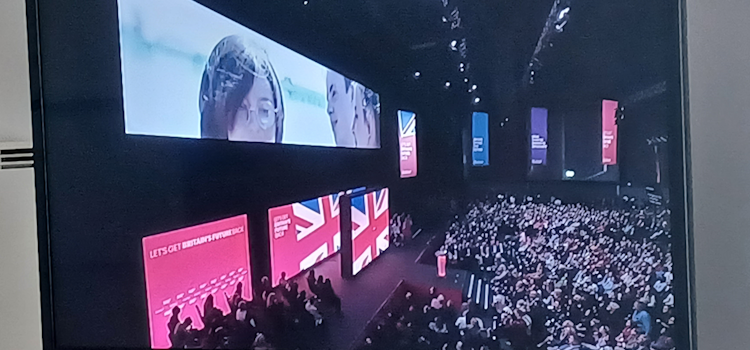On the economics, about micro-, macro- and the economics of ideas.
The popular will of the masses

Starmer was glitter bombed at conference, the person that did this is part of the people demand democracy campaign who are campaigning for both proportional representation and a sortition based 2nd house, which they call a people’s house. They seem very proud of the impact their demo had, although I have to ask, why only at Labour conference. The rest of this article looks at citizen’s assemblies and Labour’s proposals for change, which last reviewed in an article, “New Britian, New Britcon” [or on Medium].
My work with CTOE has introduced me to several campaigning academics who have studied these citizen’s assemblies and developed a great belief in them. Such assemblies have been successful in numerous places such as Ireland, Iceland and Chile where they have been used to shape the debate and decisions on the constitution. The London Borough of Newham has implemented one and there are a number of others developed in the UK, and reported by the Constitution Unit whereas a more global view is taken at Bürgerrat who reference the OECD’s catalogue. Newham are to be congratulated because as we explore below, politicians are loathe to share either power or democratic legitimacy and in the UK, proposals such as this, for example the neighbourhood assemblies are often about putting barriers in the way of political party’s manifestos, enabling the the super-active and NIMBYism. Any representative body can and probably should convene Citizen’s Assemblies and the Ost Belgien model shows how even the agenda i.e. topic selection of citizen’s assemblies can also be devolved and a rolling programme implemented without creating a new class of unelected politician.
The citizens’ assembly that has preoccupied me is the EU’s Conference on the Future of Europe, which made numerous recommendations, including that the experiment be continued, however, there is a growing opposition within particularly the European Parliament to proposals for powerful citizens assemblies. This would seem natural where people argue about a superior democratic legitimacy of citizens assemblies, even as is the case of CoFoE the agenda was tightly controlled by the institutions and the membership of the assembly stuffed with politicians from those institutions. At a more cynical level, those that have power rarely want to share it and often mythologise the role of the institutions to which they belong; from wikipedia’s article on parliamentary cretinism, in the words of Friedrich Engels:
‘Parliamentary cretinism’ is an incurable disease, an ailment whose unfortunate victims are permeated by the lofty conviction that the whole world, its history and its future are directed and determined by a majority of votes of just that very representative institution that has the honour of having them in the capacity of its members.
I argue that the legitimacy of citizens’ assemblies is based on their expertise. The role of citizens’ assemblies is that people’s lived conditions and experience is directed towards solving a problem not on portfolio governance. This local expertise is then applied to specific problem solving and solutions development. The ‘lived experience’, the closeness to the problem, local expertise all lead to an enhanced solution development process and the focus on solution design is enforced by term limits. All of this makes sortition or random selection an effective, useful, and enhancing selection technique; it eliminates manifestos and prejudgement and weakens the personal networks of leading politicians. Citizen’s assemblies are also best when given a project or task & finish framework. Merely creating a new group of politicians chosen by random lot is not a democratic advance.
I ask myself, if there a dichotomy in political decision making between polarising decisions and decisions better taken by consensus, if so then sortition assemblies maybe better at developing consensual solutions. Pendulum i.e. polarising decisions might be better taken by representative assemblies. If this is right, then the role of referendums needs to be considered carefully. It seems to me that they have no role in either type of decision, certainly not if there is no super majority threshold.
Labour’s proposals are for an elected 2nd chamber with a renewed mandate. They also conceive of a treaty/constitution which the new 2nd chamber would enforce by having the power to reject Commons’ laws that breached the treaty thus ending Parliamentary Sovereignty. Again Labour’s proposals, have little room for the role of a revising chamber which study of the Commons over the last 10 years shows is badly needed. I have little doubt that the power of scrutiny and quality of legislation could be improved and that for some legislation there should be a means by which expert opinion can be sought.
There’s lots of room to do democracy better, but replacing representative democracy with juries is not really one of them. The advocates of Citizens’ Assemblies should not be suggesting they are an alternative, but they are a democratic supplement. …














